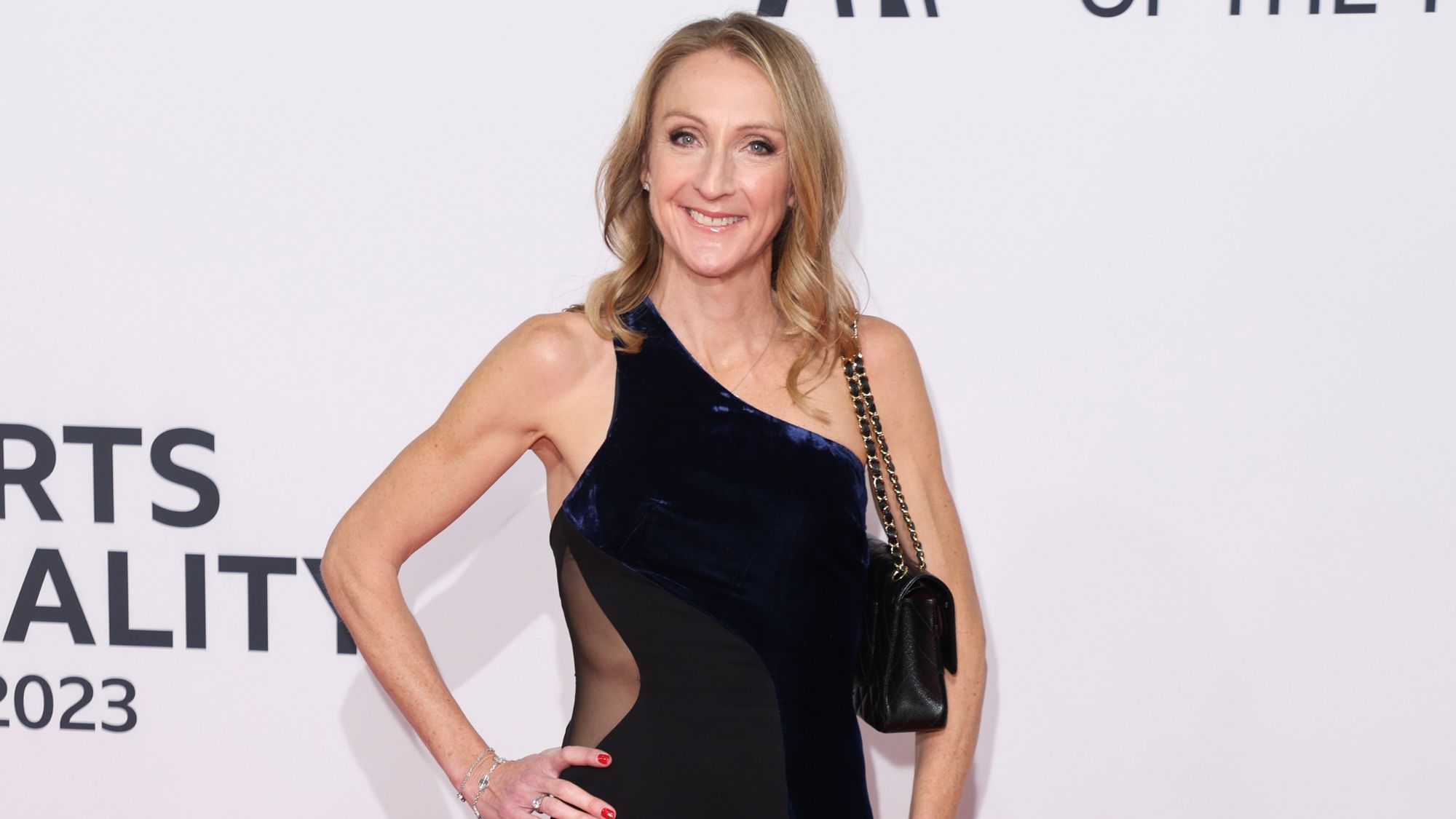In celebration of the 70th anniversary of BBC Sports Personality of the Year: Dame Mary Peters and Paula Radcliffe share their top tips for improving your fitness
Health contributor Abbi Henderson chats with the two former athletes.


Celebrity news, beauty, fashion advice, and fascinating features, delivered straight to your inbox!
You are now subscribed
Your newsletter sign-up was successful
Although currently knee-deep in cosy season and with social commitments and Quality Streets coming thick and fast, it's never a bad time to be thinking about your own health and fitness goals. Keen for some advice on how to improve your fitness, if that’s what you’re working towards? Well, who better to learn from than two of Great Britain and Northern Ireland’s most successful female athletes?
In celebration of the 70th anniversary of BBC Sports Personality of the Year, which took place last night and saw former Marie Claire UK Guest Editor Mary Earps win the title for 2023, we caught up with two previous winners. Here, Dame Mary Peters and Paula Radcliffe chat about the lessons they learned through failure, their best advice for boosting motivation, and how to put in your best performance from your local gym or the comfort of your own home.
Peters was named BBC Sports Personality of the Year in 1972 after winning gold in the women’s pentathlon at the Olympics that same year. Long-distance runner Radcliffe received the award in 2002 after her first of three London Marathon wins (the second and third came in 2003 and 2005). For 16 years, she held the women’s world marathon record (only beaten in 2019), and she also placed first in the New York, Chicago and Helsinki marathons, too. You’d be hard-pressed to find anyone better qualified for imparting fitness and training advice.
How to improve your fitness
What is the best way to increase fitness?
Before we delve into our athletes’ best pearls of wisdom, what we will say is that there’s no blanket answer for improving your fitness. There are many variables, such as your starting point, your age and lifestyle, if you’re nursing any injuries, and also how you define fitness (to one person, fitness could look like running marathons, to someone else it could look like energy enough to kick a ball around with your children).
All that to say, we won’t be discussing the intricacies of improving your fitness levels here – instead, we’ll be sharing some key learnings to make your journey that bit easier to navigate.
How to improve your fitness: 8 athlete-recommended tips
1. Set realistic (and audacious) goals
Obvious, perhaps, but it can be helpful to remember that even the best in the world are chipping away at goals – and they’re living, breathing proof of how important it is to have something to work towards.
Every year, on January 1st, Radcliffe writes down her goals for the year. It’s a practice she’s been doing since she was 11 years old. “I write out my dream goals and my realistic goals,” she says. “The realistic ones are the ones you pretty much think you can do, you just have to work hard to achieve, and dream ones are the ones really up there – like an Olympic medal.”
Celebrity news, beauty, fashion advice, and fascinating features, delivered straight to your inbox!
Her coach introduced her to the habit, emphasising big, audacious and seemingly impossible goal setting. “He said that if you don't try for those, you're never going to know what you're capable of,” Radcliffe says.
“I think having a direction really helps when it becomes tough. It’s taking the time to think about what really lights that passion for me. What can really inspire me even on those days when I really don't feel like getting out of bed?”
2. Find an activity you enjoy
Peters’ best piece of advice is to simply do the types of movement you find pleasure in.
“I just think it's important to enjoy it,” she says, when asked about her tips for feeling motivated. Plainly: “if you don't enjoy your sport, it's not worth taking part.” She’s got a point.
“I've had such enjoyment out of my sport that I can look back on a very good career that brought me lots of pleasure and joy,” Peters adds.
While you may not feel the same delight at the thought of partaking in sports (A-OK, by the way), it’s worth taking the time to find the activities that do feel fun to you.
A post shared by BBC SPORT (@bbcsport)
A photo posted by on
3. Experiment with exercise
That leads us nicely onto the next tip: try different things.
Before switching to marathons in 2002, Radcliffe was predominantly running track and cross-country. It wasn’t until she made the transition that she really hit her stride (pardon the pun.
“The marathon is a tough event,” Radcliffe says. “We didn't think that you should do it just because physiologists told you that, on paper, you would be good at it; we thought you should do it when you really wanted to, and when you really felt ready to take on that challenge.
“I think that's why I love 2002 so much because I literally went in with no expectations, no race plan other than just to stay with the lead group for as long as possible, learn as much as possible and enjoy it. I was just thinking, well, if it goes wrong, I'll just say it was my first one and I just messed up.”
Of course, you don’t need to start marathon training, if that’s not your cup of tea. But, Radcliffe’s story demonstrates that there’s lots to be gained from exploring our interests. So, we recommend signing up for a new class or two…
4. Lower the barrier to entry
It’s normal to experience dips in motivation, and days where you’d rather do literally anything else instead of exercising. Fortunately, Radcliffe has a couple of tried-and-tested tricks for you to lower the barrier to entry and get you moving.
“I used to have a 10-minute rule where, if I wasn't feeling better 10 minutes into the run, then I could turn around and come back and usually that would kind of help,” she says. She also had a few favourite, less challenging, routes that she’d opt for on low-motivation days to ensure she still got the miles in.
“You can promise yourself an extra treat when you get back, if that helps, and I think that when you've got a goal, it's so much easier to keep going.”
5. Equipment is ideal, but you can improve your fitness without it
Depending on the type of fitness you’re looking for (improved strength or cardiovascular fitness, for example), equipment is likely going to play a key role in helping you reach your goal. That said, you can improve your fitness from home, with bodyweight exercises.
During our interview, Peters shares her own story of training as a teen, when equipment and quality facilities were unfortunately inaccessible. “I only started training seriously when I was at school at the age of 16, and by the time it came to my Olympic preparation, which was many years later, I didn't have a track to train on,” she recalls. “The Troubles were at their height in Northern Ireland, I still worked full time and I was 33 by the time I competed in 1972. So everything was really against me, but I dug in, and decided that I was going to win the gold in Munich.”
A post shared by Match of the Day (@bbcfootball)
A photo posted by on
6. A supportive community is crucial
Both athletes emphasise the importance of having a good support network and a community to keep you going during the good and the tough times.
“It doesn't have to be a huge community,” says Radcliffe. “It doesn't have to be a stadium full of people. It can just be your husband and your kids or your mum and your dad. But, I think just knowing that you have that support team behind you is huge.”
It’s one of the reasons she enjoys running so much. “Whether you're doing a Park Run on a Saturday morning or running the London Marathon, you still feel the benefit of that kind of community of runners around you. We're all doing pretty much the same thing. We're all working towards it each week. And we all know that everybody's had ups and downs along the way to get there, and we're all going to help each other get through it on the day.”
7. Control the controllables
When difficult situations arise, focus on what you can control.
“My dad was really good at teaching me to control what I can control and not to worry about what I can't control,” Radcliffe says. “You can't control what shape your rival is going to turn up in. You can't control which rivals are going to turn up. You can't control the weather. But, you can control your shape, how you're going to race and how you're psychologically going to deal with that.
“I think it’s learning to focus your energy on things that can actually make a difference and not waste that energy somewhere you can't do anything about.”
8. Learn to reframe your "failures"
“You probably learn more from failures than you do from successes,” Radcliffe says. She’s someone who has experienced many incidents that could be perceived as failures.
“For me, it's a perspective thing,” she says. “Like, if you make that mistake in a race then that's what's going to happen. So, you learn from it and you don't make that mistake again. Then, there's listening to your body, and acknowledging you can’t just run through every injury because it will just end up getting worse.”
Sometimes, there are difficult-to-take lessons that teach you more about sitting with and managing emotions than performance tweaks. “Sometimes shit just happens,” Radcliffe says. “Sport is like that – sometimes you're just not right, you might get a cold, and it's just unfair."
"I think that’s one of the biggest lessons; we love sport because it’s so unpredictable and is about really seizing that moment, but sometimes it’s just unfair, and you just have to get over it and keep going.”
Our guide to reframing negative thoughts might come in handy here.
To read more from the Sports Personality of the Year 2023 winner Mary Earps, check out our Guest Edit from her and fellow Lioness Millie Bright.

Abbi Henderson is a freelance journalist and social media editor who covers health, fitness, women’s sport and lifestyle for titles including Women's Health and Stylist, among others.
With a desire to help make healthcare, exercise and sport more accessible to women, she writes about everything from the realities of seeking medical support as a woman to those of being a female athlete fighting for equality.
When she’s not working, she’s drinking tea, going on seaside walks, lifting weights, watching football, and probably cooking something pasta-based.